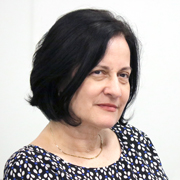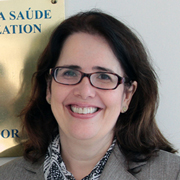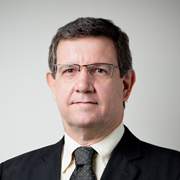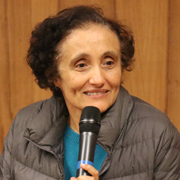Board

Roseli de Deus Lopes (director chosen by IEA's Board)
An associate professor at USP's Polytechnic School, Roseli de Deus Lopes is the coordinator of several programs of the University's Dean for Research and general coordinator of the Brazilian Science and Engineering Fair (FEBRACE), which she has conceived. It is a national movement of international projection to encourage young scientists, annually holding a large exhibition of research projects developed by basic education students. Lopes is a member of the Board of the Brazilian Society for the Progress of Science (SBPC). She has been director of Estação Ciência and academic coordinator of the program "USP and the Professions," both linked to the Dean for Culture and Extension.
Marcos Buckeridge (deputy director chosen by IEA's Board)
An Associate Professor at the Department of Botany of the University of São Paulo, Marcos Buckeridge is the Director of the National Institute of Science and Technology of Bioethanol (INCT do Bioetanol). From 2009 to 2012 he was also Scientific Director of the Brazilian Bioethanol Science and Technology Laboratory (CTBE), in Campinas. He is Communicating Editor Bioenergy Research (Springer) and Reviews Editor for Trees: structure and function (Springer). Buckeridge's work has generated 3 edited books and more than 150 publications in plant physiology, biochemistry and molecular biology of plant growth and development related to the Global Climate Changes and bioenergy production. In 2010, Buckeridge was appointed a Lead Author for the Intergovernmental Panel of Climatic Changes (IPCC) report (AR5) released in 2014. He is the actual President of the Academy of Sciences of the State of São Paulo. He is a member of the Institute of Advanced Studies of the University of São Paulo as member of the research group on Environmental Studies and being the actual coordinator of the USP Global Cities Program.

Elisabete Moreira Assaf (coordinator of IEA's São Carlos Center chosen by USP's President from a shortlist of three candidates voted by IEA's Board)
Holder of a Ph.D. in Chemical Engineering from USP (1994) and a Master's degree in the same field from the Federal University of São Carlos (1988), Elisabete Moreira Assaf has experience in Chemistry, acting on the following subjects: steam reforming, dry reforming and partial oxidation of methane, ethanol and glycerol steam reforming, acetic acid steam reforming, CO and CO2 hydrogenation, shift and prox-CO reaction. The catalysts are prepared and characterized and are based in Ni, Co and Cu supported on CeO2, Al2O3. SiO2, ZrO2, perovskites, hydrotalcites and others.
 Carla Ventura (coordinator of IEA's Ribeirão Preto Center chosen by USP's President from a shortlist of three candidates voted by IEA's Board)
Carla Ventura (coordinator of IEA's Ribeirão Preto Center chosen by USP's President from a shortlist of three candidates voted by IEA's Board)
Carla Aparecida Arena Ventura, completed her Bachelors Degree in International Relations at the University of Brasília (UnB), Brazil, and a Bachelor Degree in Law at the University of the State of São Paulo (UNESP), Brazil. She has an MBA from the University of São Paulo (USP), Brazil, received her Master in International Law from the University of the State of São Paulo (UNESP), Brazil and her Doctoral Degree in Administration from the University of São Paulo (USP), Brazil. During her PhD studies, she was a Fulbright Scholar at the Catholic University of America Columbus School of Law, USA. She was the Academic Coordinator of the International Research Capacity Building Program for Health Related Professionals to study the Drug Phenomenon in Latin America and the Caribbean (IRCBP), organized by Centre for Addiction and Mental Health at the University of Toronto, Canada, in partnership with the Organization of American States, in 2014 and 2015. In 2014, she was a Fulbright Scholar at the Center for Civil and Human Rights, University of Notre Dame, South Bend, USA. She develops research on human rights, mental health and drugs; stigma and human rights; health law; international health and development; human rights education, social participation and control.
Daiane Carolina Silva (postgraduate student representative chosen by the student members of the University Council)
Currently pursuing a master's degree in international political economy and climate change financing at USP's Institute of International Relations (IRI), Daiane Carolina Silva earned a bachelor's degree in international relations from the same institution. Her studies had a focus on economics and a specialization in strategic cooperation between countries with different emissions profiles. She holds a technical certification in environmental management. She was a research assistant at Grupo Santander Brasil, where she participated in the development of climate risk scenarios for South America and risk appetite studies. She worked as a junior researcher with a grant from Brazil's National Council for Scientific and Technological Development (CNPq), applying advanced quantitative methods to analyze trade interdependencies, and was a member of research teams at the Innovation and Science Diplomacy School at USP. Her work covers topics such as the Amazonian bioeconomy, Brazilian climate diplomacy, carbon markets, and the integration of green hydrogen into emissions trading systems.
José Vicente (representative of civil society chosen by USP's President - no teaching ties to the University)
A lawyer and a sociologist, José Vicente is the President of Zumbi de Palmares University (UZP). He holds a Ph.D. in Education and a Master's in Administration from the Methodist University of Piracicaba, and a Master's in Legal Sciences from the Paulista School of Law. In addition to directing UZP, he is a member of Brazil's Council of Sustainable Social and Economic Development (CDES), linked directly to the Presidency of the Federal Republic, and of the Editorial Board of the Folha de S.Paulo newspaper. He has served on the Brazilian Federation of Banks (FEBRABAN), the Municipal Chamber of São Paulo, the Superior Council for Social Responsibility at the Federation of Industries of the State of São Paulo (CONSOCIAL/FIESP), the independent organization Todos Pela Educação, and the Latin American Memorial Council.

Luís Reynaldo Ferracciú Alleoni (USP professor chosen by the President from a shortlist of three candidates voted by IEA's Board)
Agronomist (1985), Master (1992) and Ph.D. (1996) in Soils and Plant Nutrition from USP's Luiz de Queiroz College of Agriculture (ESALQ). Visiting Researcher at the University of Florida, USA (2005-2006). Full Professor of the Department of Soil Science, Coordinator of the Multi-User Analytical Center for Enviromental Analysis of ESALQ/USP, scientific member of the Board of the Institute of Advanced Studies at USP, and scientific director of Agrisus Foundation. He has been Chief of the Department of Soil Science, President of the Committees of Teachers Activities, Covenants and Culture and Extension of ESALQ/USP and Coordinator of the USP Extension Courses Chamber, Editor in-Chief of Scientia Agricola (scientific journal) and Vice-President of the Brazilian Association of Scientific Editors. His expertise is in Soil Chemistry and Fertyility, focusing on the behavior of potentialy toxic elements in soil and environment, soil chemical attributes as affected by soil management, and scientific writing and communication.
 Ester Sabino (USP professor chosen by the University Council)
Ester Sabino (USP professor chosen by the University Council)
A full professor in the Department of Pathology at USP's School of Medicine, Ester Sabino is a professor at the Municipal University of São Caetano do Sul (USCS) and director of USP's Institute of Tropical Medicine from 2015 to 2019. She is a member of the Brazilian Academy of Sciences and has been awarded the Armando Salles de Oliveira Medal and the 2026 TWAS Prize in Medical Health Sciences. She serves as the principal investigator for the Recipient Epidemiology and Donor Evaluation Study‐IV‐Pediatric (REDS‐IV‐P) program at the National Heart, Lung, and Blood Institute (NHLBI) and the São Paulo-Minas Gerais Neglected Tropical Disease Research Center for Biomarker Discovery. Main research areas: transfusion safety, HIV, Chagas disease, emerging viruses, and sickle cell anemia
Nina Beatriz Stocco Ranieri (USP professor chosen by the President)
Nina Beatriz Stocco Ranieri is an associate professor at the Department of Public Law of USP's Law School (FD), a senior researcher at the Research Center for Public Policy at the same University, and holder of the UNESCO Chair on the Right to Education, established at FD. She holds a Ph.D. in Public Law from USP. She has held many positions in the São Paulo State Government and public education, and advised international and national entities on aspects of the right to education and education law. Author of several books and articles in Public Law and Education Law, she is also a member of a number of national and international academic editorial boards.
Celso Lafer (chosen by USP's President after a triple list voted by the Board)
Former lecturer at the Department of Philosophy and General Theory of Law at USP's Faculty of Law, Lafer was also Minister of Development, Industry, and Commerce in 1999, and Minister of Foreign Affairs on two occasions: in 1992, under Fernando Collor, and from 2001 to 2002, during the last two years of the Fernando Henrique Cardoso administration. He was also ambassador and head of the Permanent Mission of Brazil to the United Nations and to other international organizations based in Geneva. In 2006, Lafer was elected to occupy chair 14 of the Brazilian Academy of Letters, in the succession of Miguel Reale. He is also a member of the Brazilian Academy of Sciences. Graduated in Law from USP in 1967, he earned his master's and doctoral degrees in Political Science from Cornell University in 1967 and 1970, respectively. In 1977 he obtained a degree in Public International Law at USP.
